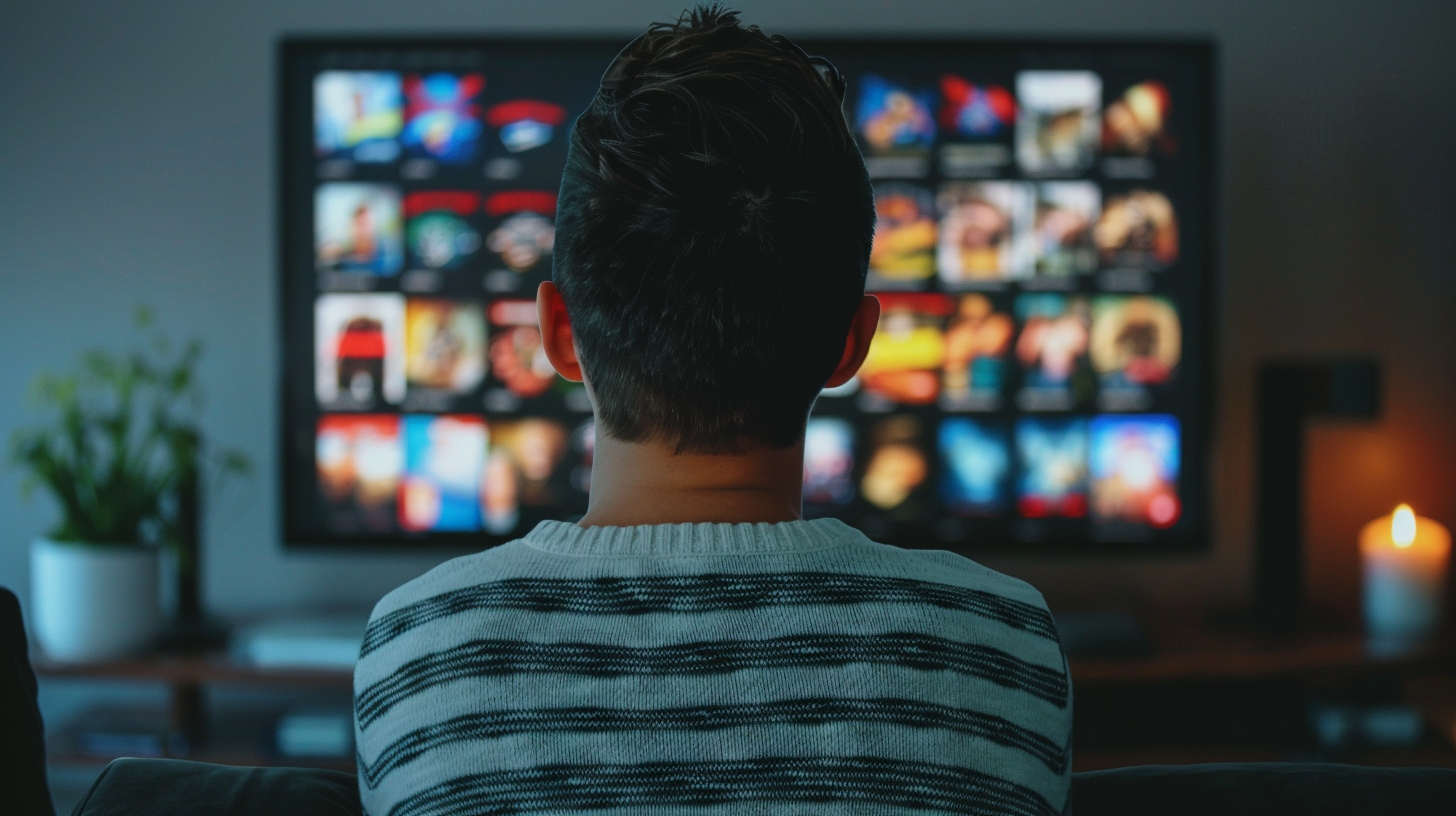Table of Contents Show
There may be products. Products are independently selected by our editors. We may earn an affiliate commission from the links with no charge to you, example: as Amazon Affiliate.
Engaging in guilt-free Netflix binging is crucial for escaping the demands of a hectic world. It allows me to unwind, recharge, and indulge in immersive storylines that offer a break from reality. Setting boundaries and approaching binge-watching mindfully can enhance the experience and prevent burnout, balancing the joy and relaxation it brings. If you want to explore more about the benefits and strategies related to guilt-free escapism through Netflix binging, there’s a wealth of information to discover in the research provided.
Key Takeaways
- Guilt-free escapism through Netflix binging offers valuable relaxation and mental breaks.
- Immersive storytelling provides temporary escape from reality’s challenges.
- Binge-watching fosters joy and enhances mood for overall well-being.
- Balancing binge-watching with boundaries and mindful viewing promotes healthy habits.
- Engaging in binge-watching as a form of self-care is essential for unwinding and recharging.
The Benefits of Escapist Entertainment
Indulging in immersive entertainment allows one to momentarily escape the stress and demands of reality. As I sink into the world of my favorite TV show or movie, I find myself transported to a place where my worries fade into the background. The ability to detach from the challenges of everyday life is a valuable benefit that escapism offers.
When I immerse myself in binge-watching sessions, I notice a significant improvement in my mood. The excitement of following intricate plotlines, getting to know complex characters, and experiencing unexpected twists all contribute to a sense of joy and anticipation. It’s a refreshing break from the monotony of daily routines.
Moreover, indulging in escapist entertainment provides me with a much-needed mental break. The constant barrage of information and responsibilities can be overwhelming, but losing myself in a captivating story allows my mind to unwind and recharge. This mental reset is essential for maintaining my overall well-being and productivity.
Psychological Impact of Binge-Watching
How does binge-watching affect our psychological well-being?
Binge-watching can have both positive and negative impacts on our mental health. On the positive side, it can provide a temporary escape from stress and everyday worries. Immersing ourselves in a captivating series can help us relax, unwind, and momentarily forget about our own problems. This form of entertainment offers a break from reality, allowing us to decompress and recharge our batteries.
However, excessive binge-watching can also have detrimental effects on our psychological well-being. Spending prolonged periods in front of a screen can lead to feelings of isolation, sedentary behavior, and disrupted sleep patterns. It may interfere with our social interactions, physical activity, and overall quality of life. Additionally, constantly consuming media without breaks can blur the line between fiction and reality, potentially impacting our perception of the world around us.
In moderation, binge-watching can be a harmless form of entertainment. It’s essential to be mindful of our viewing habits and prioritize balance to safeguard our psychological health.
Escaping Reality: A Healthy Distraction
Escaping into a binge-watching session offers a welcome break from the demands of reality. It allows me to immerse myself in captivating storylines, transporting me to different worlds and providing a temporary escape from everyday stressors. This form of entertainment serves as a healthy distraction, giving me the opportunity to unwind and recharge. While some may view binge-watching as a mindless activity, I find it to be a valuable way to relax and take a mental break.
| Benefits of Binge-Watching | Description |
|---|---|
| Stress Relief | Engaging shows can help alleviate tension and anxiety. |
| Entertainment | Enjoyment of compelling narratives and characters. |
| Social Connection | Bonding over shared favorite series with friends. |
| Escapism | Temporary detachment from real-life responsibilities. |
| Self-Care | Allowing oneself guilt-free time for personal enjoyment. |
The Art of Mindful Viewing
Engaging with content mindfully enhances my viewing experience, allowing me to appreciate the nuances and depth of the storytelling. When I watch a show or a movie with intention and focus, I pick up on subtle details that I might’ve missed otherwise. I notice the way the camera lingers on a certain shot, the expressions that pass fleetingly across the characters’ faces, and the significance of background elements. Mindful viewing transforms watching into an active rather than passive experience.
This approach also helps me connect more deeply with the themes and messages embedded in the narrative. By immersing myself fully in the story unfolding on the screen, I can better empathize with the characters’ struggles, celebrate their victories, and ponder the underlying meanings. Mindful viewing turns entertainment into an opportunity for reflection and emotional engagement. It allows me to savor each moment, making the viewing experience richer and more fulfilling.
Setting Boundaries for Binge-Watching
When it comes to binge-watching, it’s crucial to set healthy boundaries to prevent burnout. Moderation is key in maintaining a balanced viewing habit that doesn’t consume all your time.
Healthy Viewing Habits
Establishing boundaries for binge-watching is essential for maintaining a healthy viewing routine. It’s easy to get lost in the allure of endless episodes, but setting limits can help prevent burnout and ensure a balanced lifestyle.
Here are three tips to cultivate healthy viewing habits:
-
Schedule Screen-Free Time: Designate specific periods each day for activities that don’t involve screens, like reading, exercising, or spending time with loved ones.
-
Set Episode Limits: Decide in advance how many episodes you’ll watch in one sitting to avoid mindlessly clicking ‘next’ and losing track of time.
-
Practice Mindful Watching: Engage fully in the show without multitasking to enhance your viewing experience and reduce the urge to binge excessively.
Avoiding Binge Burnout
To avoid burnout from binge-watching, I find it crucial to set clear boundaries for my viewing sessions. I designate specific days or times for watching, ensuring it doesn’t interfere with my responsibilities.
By setting limits on the number of episodes I watch in one sitting, I prevent exhaustion and maintain a healthy balance. Taking breaks between episodes allows me to rest my eyes and mind, preventing fatigue.
Engaging in other activities besides binge-watching helps me stay active and social. It’s essential to listen to my body and mind’s signals to know when to stop and resume watching later.
Establishing these boundaries enables me to enjoy binge-watching without it becoming overwhelming.
Binge-Watching Vs. Traditional TV Viewing
As a television enthusiast, I find binge-watching to be a more immersive and satisfying experience compared to traditional TV viewing. When I settle in for a binge-watching session, it’s like embarking on a journey where I can fully immerse myself in the storyline without interruptions.
Here are three reasons why binge-watching trumps traditional TV viewing for me:
-
Emotional Investment: Binge-watching allows me to form deeper emotional connections with the characters and their journeys, making the viewing experience more impactful.
-
Story Continuity: With binge-watching, I don’t have to wait a week for the next episode, ensuring that the storyline flows seamlessly and keeps me engaged.
-
Flexibility and Control: Binge-watching gives me the freedom to watch multiple episodes in one sitting or space them out based on my schedule, providing a sense of control over my viewing experience.
Social Connection Through Binge-Watching
Engaging with friends and family through shared binge-watching sessions fosters a sense of camaraderie and connection. There’s something uniquely bonding about spending hours engrossed in a series together, laughing at the same jokes, gasping at the same plot twists, and discussing the characters as if they were mutual friends. These shared experiences create inside jokes, deepen relationships, and provide a common ground for meaningful conversations.
Personally, I’ve found that binge-watching with loved ones has strengthened my relationships in unexpected ways. Whether it’s a weekly tradition with friends to watch the latest episodes of a favorite show or a cozy night in with family to marathon a new series, these shared moments have become cherished memories that we revisit and laugh about long after the screen has gone dark.
In a world where our schedules are often packed and distractions are plentiful, binge-watching offers a chance to connect with others in a relaxed and enjoyable setting. So, next time you’re debating what to watch, consider inviting someone to join you – the shared experience may just bring you closer together.
The Evolution of Binge-Watching Culture
The rise of streaming platforms like Netflix has revolutionized how we consume entertainment, shaping the evolution of binge-watching culture. As a dedicated binge-watcher, I’ve witnessed firsthand how this cultural shift has transformed our viewing habits and behaviors. Here are three key aspects that highlight the evolution of binge-watching culture:
-
Instant Gratification: The ability to access entire seasons of our favorite shows with just a few clicks has fueled our desire for instant gratification, making it hard to resist the urge to binge-watch for hours on end.
-
Community Engagement: Binge-watching has become a communal experience, with viewers engaging in online discussions, sharing memes, and forming fan theories, creating a sense of belonging and connection within the fandom.
-
Escapism and Relaxation: In today’s fast-paced world, binge-watching offers a form of escapism and relaxation, allowing us to unwind and immerse ourselves in captivating storylines without judgment or guilt.
Finding Balance in Binge-Watching
Navigating the fine line between indulging in Netflix binging and maintaining a healthy lifestyle can pose a real challenge for many avid viewers like myself. Finding balance in binge-watching requires self-discipline and awareness of one’s habits.
Setting boundaries is crucial; I designate specific times for watching shows and ensure they don’t interfere with essential tasks or sleep. It’s easy to get carried away, so I use tools like alarms to remind me when it’s time to take a break. Incorporating physical activity into my routine helps counteract the sedentary nature of binge-watching.
During viewing sessions, I make a point to stretch or do quick exercises to stay active. Additionally, I try to balance my content choices by mixing genres to prevent monotony. By being mindful of my viewing habits and making conscious efforts to prioritize wellness, I can enjoy guilt-free escapism without sacrificing my overall well-being.
Frequently Asked Questions
How Does Binge-Watching Affect Our Sleep Patterns?
Binge-watching affects sleep patterns by disrupting the body’s natural wind-down process. The bright screens and engaging content can delay melatonin release, making it harder to fall asleep. Establishing a bedtime routine can help mitigate these effects.
Can Binge-Watching Lead to Addiction or Unhealthy Behaviors?
Binge-watching can lead to addiction or unhealthy behaviors if not managed. It’s important to set limits, take breaks, and prioritize other activities. Self-awareness and balance are key to enjoying entertainment without it negatively impacting daily life.
What Are the Long-Term Effects of Excessive Binge-Watching on Mental Health?
Binge-watching can impact mental health long-term. Excessive screen time may lead to sleep disturbances, social isolation, and decreased productivity. It’s crucial to balance entertainment with self-care to maintain a healthy mind.
How Does Binge-Watching Impact Our Relationships With Others?
Binge-watching impacts relationships by consuming time that could be spent together. It can lead to isolation and lack of communication. Balance is essential to maintain healthy connections with loved ones while enjoying entertainment.
Is There a Difference in the Way Our Brains Process Information While Binge-Watching Compared to Traditional TV Viewing?
When binge-watching, my brain seems more absorbed, craving continuous content. It’s like a mental marathon, processing information rapidly, sometimes blurring between episodes. Traditional TV feels slower-paced, allowing breaks for reflection.
Conclusion
As I sink deeper into my Netflix binge, I can’t help but feel a sense of guilt creeping in. But then I remember, sometimes a little escapism is just what the doctor ordered.
So here I am, embracing the guilt-free joy of getting lost in a world that’s not my own. Who knew that escaping reality could actually bring me back to myself?
Cheers to Netflix binging, the ultimate form of self-care.









